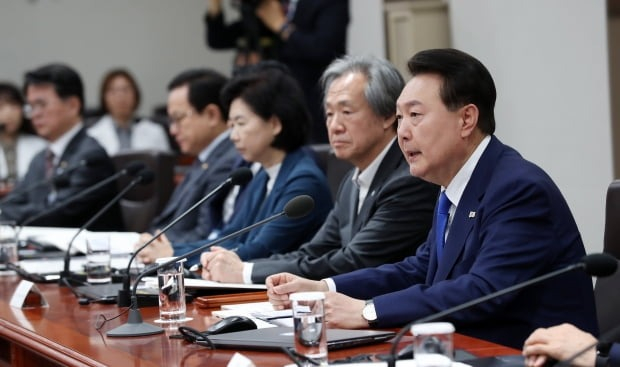COVID-19
Korea to lift most COVID-19 rules with lower crisis level
Mask mandate to be dropped and just 5-day quarantine, not 7-day isolation for patients; visitors won't need PCR tests for entry
By May 11, 2023 (Gmt+09:00)
1
Min read
Most Read
LG Chem to sell water filter business to Glenwood PE for $692 million


KT&G eyes overseas M&A after rejecting activist fund's offer


Kyobo Life poised to buy Japan’s SBI Group-owned savings bank


StockX in merger talks with Naver’s online reseller Kream


Meritz backs half of ex-manager’s $210 mn hedge fund



South Korean President Yoon Suk Yeol on Thursday declared an end to most COVID-19 restrictions including mandatory quarantine for patients of the pandemic as the country downgraded its national crisis level for the disease.
Yoon said the government decided to recommend only a five-day isolation for COVID-19 patients instead of requiring a seven-day segregation from June while lifting advised polymerase chain reaction (PCR) tests for inbound travelers and indoor mask mandates except for risky facilities such as hospitals with wards.
“The CDSCH today lowered its national crisis level for COVID-19 to an alert level from the serious level and decided to apply (eased measures) from June,” Yoon said in the meeting of the Central Disaster and Safety Countermeasures Headquarters at the presidential office.
“The move actively reflected the WHO’s declaration of an end to the virus as a global health emergency and the government’s national infectious disease response advisory committee’s advice to lift the crisis level,” Yoon said. “We are pleased that people in the country can finally fully resume their everyday activities after three years and four months.”
TO STAY VIGILANT
The World Health Organization last week declared that COVID-19 no longer represents a global health emergency.
After that, Japan entered its post-pandemic phase, officially downgrading the disease to a status on par with seasonal flu and removing a range of restrictions against it.
South Korea, however, plans to keep providing medical expenses including costs for vaccines and treatments while maintaining a response system to deal with the potential resurgence of COVID-19.
The government is set to consider preemptive measures if the pandemic becomes prevalent again.
Write to Byung-Uk Do at dodo@hankyung.com
Jongwoo Cheon edited this article.
More to Read
-
 Shipping & ShipbuildingHanwha Ocean shares sink after KDB's sale of 4.2% stake
Shipping & ShipbuildingHanwha Ocean shares sink after KDB's sale of 4.2% stakeApr 29, 2025 (Gmt+09:00)
-
 EnergySouth Korea nears Czech nuclear deal; Doosan, related stocks fly high
EnergySouth Korea nears Czech nuclear deal; Doosan, related stocks fly highApr 25, 2025 (Gmt+09:00)
-

-
 Business & PoliticsSeoul, Washington agree on July tariff deal framework in '2+2' trade talks
Business & PoliticsSeoul, Washington agree on July tariff deal framework in '2+2' trade talksApr 25, 2025 (Gmt+09:00)
-

Comment 0
LOG IN


